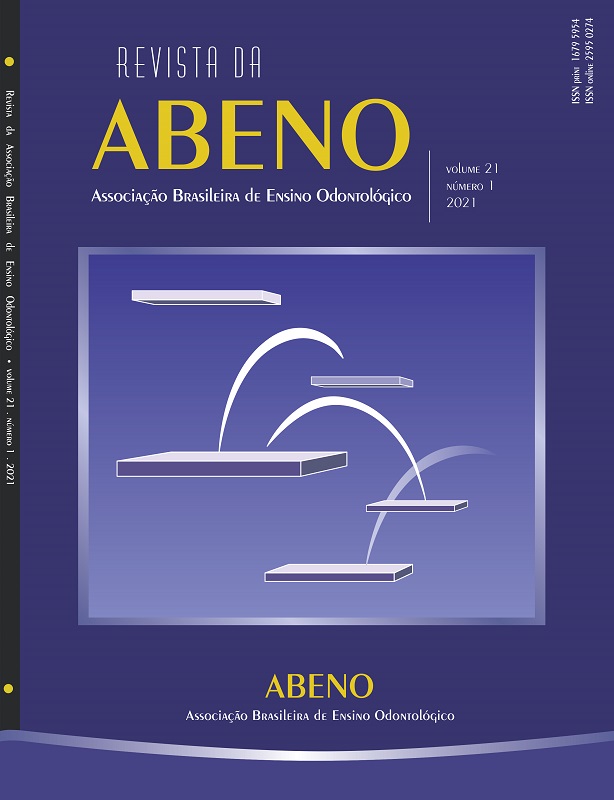Report of an experience: self-study to foster self-regulated learning for International Dental Degree Program (IDDP) students in Canada
DOI:
https://doi.org/10.30979/rev.abeno.v21i1.1195Palabras clave:
Education, Dental, Students, Evidence-Based Dentistry.Resumen
This article aimed to briefly report a self-study methodology experience performed in the International Dental Degree Program (IDDP) in a University in Canada. This approach fostered students` self-regulated learning. Due to Covid-19 pandemic the on-site dentistry school classes were discontinued. Students from the IDDP were allowed to go to on-site only to perform pre-clinical activities (supervised by one faculty member at a time). As the 2020 class of the IDDP program was small (2 students), the director of the IDDP Program and faculty members considered that self-study would be an appropriate idea. We noticed that students were successful in self-regulating their learning. Some of the examples for that were: students used note-taking sheets, monitored their comprehension of class lecture material, asked questions etc. The experience with IDDP students showed that the self-study opportunity was a favorable learning environment for the teaching of pre-clinical disciplines.
Descargas
Citas
(1) Boorberg NB, Schönwetter DJ, Swain VL. Advanced placement, qualifying, and degree completion programs for internationally trained dentists in Canada and the United States: an overview. J Dent Educ. 2009;73(3):399-415.
(2) Barbosa J, Silva A, Ferreira MA, Severo M. The impact of students and curriculum on self-study during clinical training in medical school: a multilevel approach. BMC Med Educ. 2017;17:9.
(3) Mishler E. Validation in inquiry-guided research: The role of exemplars in narrative studies. Harvard Educational Review. 1990;60(4), 415-42.
(4) LaBoskey VK. The methodology of self-study and its theoretical underpinnings. Chapter 21. In: Loughran JJ, Hamilton ML, LaBoskey VK, Russell T. International Handbook of Self-Study of Teaching and Teacher Education Practices. Springer International Handbooks of Education book series (SIHE, volume 12), 2004.
(5) Lan M, Hou X, Qi X, Mattheos N. Self-regulated learning strategies in world's first MOOC in implant dentistry. Eur J Dent Educ. 2019;23(3):278-85.
(6) Zimmerman M‐P. Construct validation of a strategy model of student self‐regulated learning. J Educ Psychol. 1988;80(3):284.
(7) Pintrich PR. Understanding self-regulated learning. New Directions for Teaching and Learning (NDTL) 1995; 63:3-12.
(8) Bowman M. The transition to self-regulated learning for first-year dental students: threshold concepts. Eur J Dent Educ. 2017;21(3):142-50.
Descargas
Publicado
Cómo citar
Número
Sección
Licencia
Derechos de autor 2021 Revista da ABENO

Esta obra está bajo una licencia internacional Creative Commons Atribución-NoComercial 4.0.
Autores que publicam nesta revista concordam com os seguintes termos:
a) Autores mantém os direitos autorais e concedem à revista o direito de primeira publicação, com o trabalho simultaneamente licenciado sob a Licença Creative Commons Attribution que permite o compartilhamento do trabalho com reconhecimento da autoria e publicação inicial nesta revista.
b) Autores têm autorização para assumir contratos adicionais separadamente, para distribuição não-exclusiva da versão do trabalho publicada nesta revista (ex.: publicar em repositório institucional ou como capítulo de livro), com reconhecimento de autoria e publicação inicial nesta revista.
c) Autores têm permissão e são estimulados a publicar e distribuir seu trabalho online (ex.: em repositórios institucionais ou na sua página pessoal) a qualquer ponto antes ou durante o processo editorial, já que isso pode gerar alterações produtivas, bem como aumentar o impacto e a citação do trabalho publicado (Veja O Efeito do Acesso Livre).






